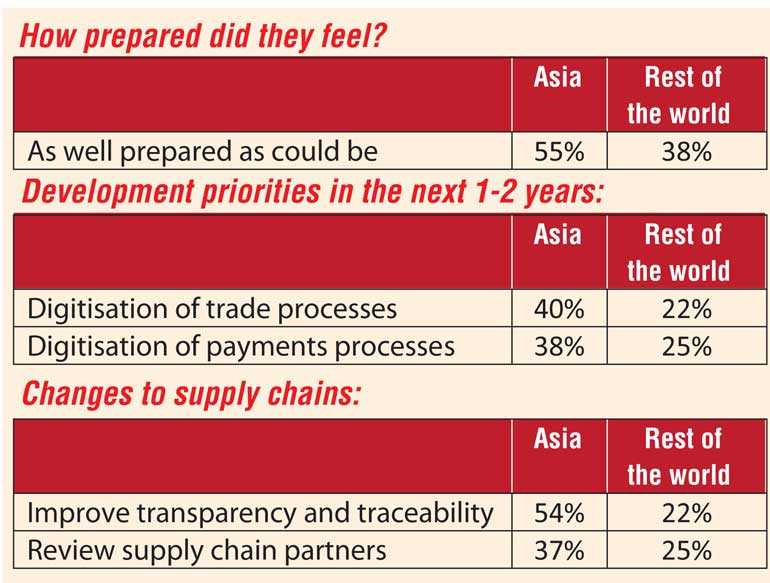Friday Feb 27, 2026
Friday Feb 27, 2026
Tuesday, 21 July 2020 00:08 - - {{hitsCtrl.values.hits}}

COVID-19 has forced Asian corporates to confront their business resilience in an unprecedented way, underlining the urgent need for greater digitisation in particular. This is according to HSBC’s Navigator report, Building Back Better, a survey of more than 1,400 Asian companies published yesterday.
The global pandemic has also driven business to rethink how they can inject more transparency and traceability into their supply chains. 
COVID-19 has exposed weak links in supply chains, and companies are shifting from a just-in-time model to just-in-case when it comes to managing their stock.
The pandemic has precipitated the worst global recession since the Great Depression, and in the months of April and May, Navigator spoke with more than 1,400 businesses from seven major Asian economies. The survey reveals that Asian companies felt more prepared to weather the challenges from the first six months of 2020.
Over half of companies in Asia indicated they were as well prepared as they could be, far more so than firms in the rest of the world.
The higher level of preparedness stands Asian firms in good stead as and when the world comes out of this public health crisis.
HSBC Regional Head of Commercial Banking in Asia Pacific Stuart Tait said: “Digitisation is no longer something that is nice to have – Asian firms have woken up to the benefits of being digital. While in the past some firms were reluctant to adopt new technologies, COVID-19 has clearly illustrated the need to embrace change.
The digitisation of processes can build resilience and safeguard against external shocks.”
Going digital
Regarding future ways of working, Asia is more likely than the rest of the world to believe that digitisation of trade and payment processes will become standard practice over the next 1-2 years. In these areas HSBC has been leading the way in applying technologies such as blockchain and APIs in digitising trade and payments processes.
Rethinking supply chains
In addition to underlining the benefits of digitisation, COVID-19 has shone a spotlight on the vulnerability of a company’s supply chain. According to Navigator, 54% of Asian companies say they will increase the transparency and traceability of their supply chains. Meanwhile, over one-third of Asian firms will review supply chain partners to ensure they are able to weather future challenges.
Tait commented: “While any bank can tell you that it’s important to know your customer and your customer’s customer, our latest Navigator survey tells us that companies are beginning to understand the importance of knowing one’s supplier – as well as those who supply their suppliers.”
Resilience – and the barriers to resilience
When asked to describe a resilient business, Asian companies say that the top three characteristics are being agile, being customer-centric, and acting in a sustainable manner. Meanwhile, when asked to name the top barriers to resilience, Asian companies cite financial factors such as having sufficient cashflow and managing the cost of working capital.
Tait concluded: “COVID-19 has been a once-in-a-century rude awakening for many companies across Asia. Resilience is about survival.
If companies are to survive and thrive, they must make changes to how they operate, whether it’s becoming more digital or strengthening their supply chains.”